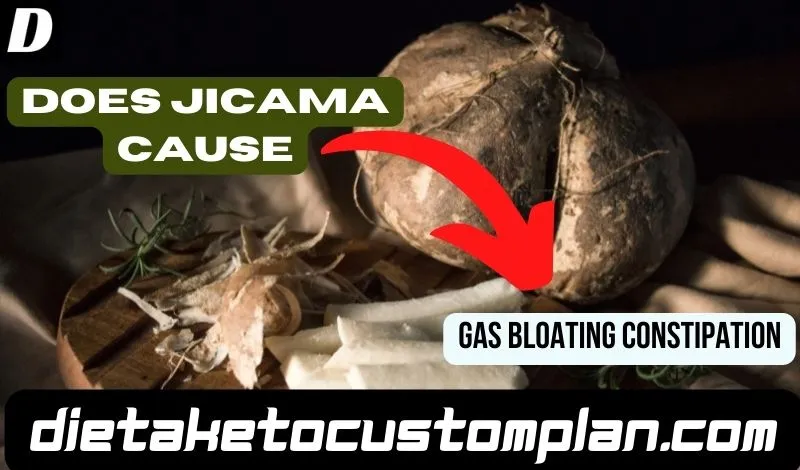Jicama is one of the most famous and highly nutritious low-carb keto vegetables. This root vegetable is also known as Yambean. Jicama contains all essential nutrients and it is a good vegetable to reduce the risk of constipation.
In fact, jicama is a good source of fiber and is beneficial for bowel movement. However, in certain circumstances, jicama can upset your stomach by triggering gas, bloating, constipation, heartburn, or diarrhea.
But why does jicama upset your stomach by causing stomach disorders? Why does jicama cause gas, bloating, constipation, or heartburn?
Let’s check the facts in detail.
Can Jicama Cause Gas?
Abdominal gas, commonly known as gas is a very common health disorder in several people throughout the world. So, what causes gas? According to studies, consuming high fiber foods boosts gas production in healthy adults (1).
Moreover, fat-rich foods can also trigger gastrointestinal problems(GI) (2). This in turn may cause gas. On the other hand, although jicama contains an almost negligible amount of fat, it is a good source of dietary fiber.
A 100-gram serving of jicama contains 4.9 grams of dietary fiber and 0.09 grams of fat (3). This high fiber component of jicama can promote intestinal wind or gas in healthy adults.
So, jicama can cause gas because it contains a high amount of gas-producing nutrient aka fiber.
Can Jicama Cause Bloating?
Consumption of fiber-rich foods is the main reason behind bloating problems. Furthermore, foods with a high FODMAP value can increase the risk of bloating, especially in patients with IBS. Studies have shown that consumption of low FODMAP value foods can reduce the risk of bloating (4).
On the other hand, although jicama contains a low FODMAP value, it is a great source of fiber. That’s why jicama can cause bloating because it is a rich source of fiber nutrients.
Moreover, the consumption of fiber-rich and high FODMAP diets with jicama may worsen the bloating problem. However, this is not directly related to jicama consumption.
Does Jicama Cause Constipation?
According to studies, consumption of high fiber can increase stool frequency, and soften the stool (5). Moreover, another study has shown that intake of fiber-rich foods can improve the frequency of stool in patients with constipation (6).
That’s why fiber is an essential nutrient for constipation cure. On the other hand, jicama is a rich source of dietary fiber. Because of this fiber-dense formula jicama can not cause constipation.
Also, jicama contains a little amount of magnesium. Magnesium is a widely used nutrient for constipation cure and smooth bowel movement. This is another reason for the non-occurrence of constipation on a diet rich in jicama.
On the other hand, too much consumption of high fiber foods can cause constipation by causing phytobezoar formation in the gastrointestinal tract. That’s why too much consumption of jicama may cause constipation by causing fiber overload.
Does Jicama Make You Poop?
Yes, jicama can make you poop because it is a great source of dietary fiber. Dietary fiber is an essential nutrient that adds stool bulk and increases the water retention of stools.
These two factors make stools easy to pass without any obstacles. That’s why fiber-rich jicama can make you poop more.
Is Jicama A Laxative?
Laxatives are used to cure bowel problems. As both fiber and magnesium help to promote smooth bowel movement, these two nutrients are widely used in laxatives. In fact, foods high in fiber and magnesium are considered natural constipation cure laxatives.
On the other hand, jicama is a good source of fiber and contains a little amount of magnesium. The presence of fiber and magnesium nutrients makes jicama a good laxative.
Does Jicama Cause Acid Reflux?
Jicama is not an acidic vegetable and because of this, it does not cause acid reflux, commonly known as heartburn. However, surplus consumption of jicama may cause acid reflux or heartburn in healthy adults.
So when does jicama cause acid reflux? Jicama is a rich source of vitamin C. According to studies consumption of vitamin c or ascorbic acid may cause heartburn (7). That’s why surplus consumption of jicama can cause heartburn through vitamin C overload.


